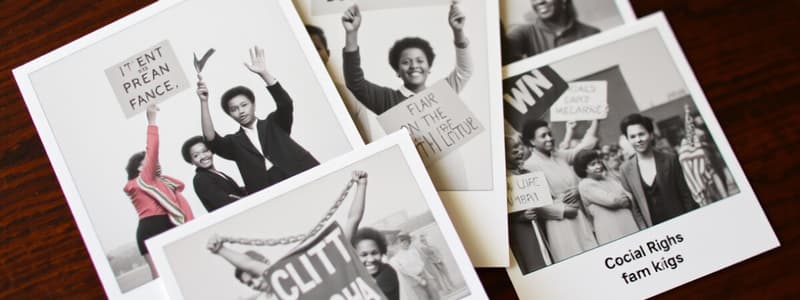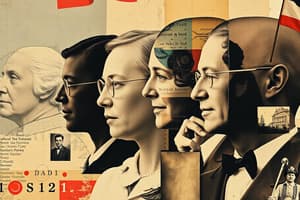Podcast
Questions and Answers
The Civil Rights movement challenged the US to rethink what ______ really means.
The Civil Rights movement challenged the US to rethink what ______ really means.
freedom
What group was known for its sit-ins, like the Woolworth's incident?
What group was known for its sit-ins, like the Woolworth's incident?
College Students
What does SNCC stand for?
What does SNCC stand for?
Student Non-Violent Coordinating Committee
Who was the leader of the SNCC?
Who was the leader of the SNCC?
What were the Freedom Rides launched by CORE intended to test?
What were the Freedom Rides launched by CORE intended to test?
What city was known as the 'Citadel of Segregation'?
What city was known as the 'Citadel of Segregation'?
Who was the police chief that unleashed forces against young marchers in Birmingham?
Who was the police chief that unleashed forces against young marchers in Birmingham?
Who organized the March on Washington?
Who organized the March on Washington?
What was a key moment of the March on Washington?
What was a key moment of the March on Washington?
What did the March on Washington demand? (Select all that apply)
What did the March on Washington demand? (Select all that apply)
Who were Jo Ann Robinson and Ella Baker?
Who were Jo Ann Robinson and Ella Baker?
Which group did civil rights activists have more hope for justice from?
Which group did civil rights activists have more hope for justice from?
What did the Civil Rights Act of 1964 prohibit?
What did the Civil Rights Act of 1964 prohibit?
The most passionate president with regard to the Civil Rights Movement was ______.
The most passionate president with regard to the Civil Rights Movement was ______.
What was the Bay of Pigs?
What was the Bay of Pigs?
Kennedy urged Americans to move beyond self-centered ______________.
Kennedy urged Americans to move beyond self-centered ______________.
Kennedy viewed the Vietnam War through the lens of ____ ____.
Kennedy viewed the Vietnam War through the lens of ____ ____.
What crisis involved Soviets having missiles aimed at the US from Cuba?
What crisis involved Soviets having missiles aimed at the US from Cuba?
What was the Great Society?
What was the Great Society?
What were the two phases of the civil rights movement?
What were the two phases of the civil rights movement?
What slogan reflected the radicalization of young activists?
What slogan reflected the radicalization of young activists?
Who was Malcolm X?
Who was Malcolm X?
What was the focus of the Anti-war movement in the late 60's?
What was the focus of the Anti-war movement in the late 60's?
What did the Equal Pay Act prohibit?
What did the Equal Pay Act prohibit?
What did Cesar Chavez lead?
What did Cesar Chavez lead?
What marked the beginning of the anti-war movement?
What marked the beginning of the anti-war movement?
What was the Tet Offensive?
What was the Tet Offensive?
What event led to the greatest outbreak of urban violence in the nation's history?
What event led to the greatest outbreak of urban violence in the nation's history?
Flashcards are hidden until you start studying
Study Notes
Civil Rights Movement
- Freedom redefined through the Civil Rights movement, emphasizing the struggles faced by marginalized groups.
- College Students led prominent nonviolent movements, including sit-ins at establishments like Woolworth's, becoming key agents of social change.
- Student Non-Violent Coordinating Committee (SNCC) aimed to replace segregation with social justice and empower African Americans.
- John Lewis emerged as a significant leader within SNCC.
- Freedom Rides, initiated by CORE, tested desegregation laws on public transport amidst violent opposition, leading to federal intervention.
Key Events and Figures
- Birmingham known as the "Citadel of Segregation," saw violent clashes during protests led by Martin Luther King Jr., garnering international attention and influencing government action.
- Eugene "Bull" Connor was the Birmingham police chief who employed aggressive tactics against peaceful protestors.
- Phillip Randolph organized the March on Washington, a pivotal moment featuring Martin Luther King Jr.'s "I Have a Dream" speech.
- March on Washington defined as the high point of the nonviolent civil rights movement, attracting massive public participation.
Demands and Legislative Actions
- Demands from the March included jobs through public works, wage increases, and anti-discrimination employment laws.
- Civil Rights Act of 1964 prohibited racial and sex-based discrimination in various public sectors but failed to address voting rights in the South.
- Lyndon B. Johnson, recognized as a passionate advocate for civil rights, faced challenges with the Bay of Pigs invasion, affecting US-Cuban relations.
Social Movements and Shifts
- The Great Society encapsulated Johnson's initiatives addressing poverty, education, and civil rights, though many programs suffered due to the Vietnam War.
- New Left represented disillusioned youth seeking authenticity, significantly influenced by the Black Freedom movement.
- Freedom Summer in Mississippi represented a violent voter registration drive, highlighting ongoing racial tensions.
Ongoing Struggles and Ideologies
- Selma, Alabama witnessed violent reactions against demonstrators, propelling the Voting Rights Act of 1965 into congressional attention.
- 24th Amendment abolished poll taxes, removing barriers to voting for poor and minority citizens.
- The Chicago Freedom Movement, orchestrated by MLK, aimed at combating discrimination in housing and employment but faced substantial opposition.
Emergence of New Movements
- Malcolm X advocated for self-defense and radical change, contrasting with King's nonviolence yet influencing future movements.
- Black Power slogan demonstrated a shift toward racial pride and assertiveness among young activists.
- Black Panthers emerged as prominent advocates for self-defense against police brutality, but their influence was short-lived.
Vietnam War and Social Unrest
- The Vietnam War catalyzed widespread protests and generational rebellion, highlighted by the My Lai Massacre and Tet Offensive.
- Growing anti-war sentiment culminated in major demonstrations, especially seen in Washington, reflecting the public’s disapproval of US involvement.
Feminism and Other Movements
- Betty Friedan's The Feminine Mystique depicted the struggles of educated women confined to traditional roles, sparking broader feminist initiatives.
- The National Organization for Women (NOW) fought for equal job and educational opportunities for women, challenging societal norms.
- The Stonewall Riots marked the initiation of the gay liberation movement, catalyzing activism for LGBTQ+ rights.
International Context and Legacy
- The 1960s saw parallel movements worldwide, including protests in Czechoslovakia and Mexico City demonstrating global demands for reform and democracy.
- The legacy of the 1960s remains complex, symbolized by transformation in societal attitudes towards race and gender while leaving unresolved urban poverty and ongoing social challenges.
Studying That Suits You
Use AI to generate personalized quizzes and flashcards to suit your learning preferences.




